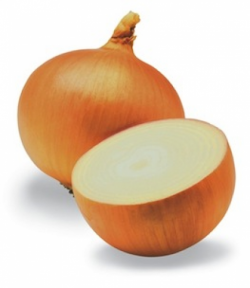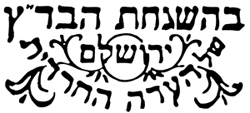What's the meaning of the Onion »
Onion
This page is about the meaning, origin and characteristic of the symbol, emblem, seal, sign, logo or flag: Onion.

When it comes to the culinary field, onions have a very mixed reputation; on the one hand they have served as an important foodstuff for thousands of years, and their natural pungency adds distinctive flavor to many dishes. On the other hand, onions are notoriously annoying to deal with since, when cut, they release gases that cause severe eye irritation and tearing, and this is sometimes enough to turn people away from them altogether. On the symbolic front, however, these same annoyances are part the reason why onions have been so valued by cultures throughout history.
One of the onion’s basic symbolic functions was as a protective item. They were believed to be effective in warding off everything from evil spirits and disease to unsavory creatures such as serpents. While notions like this may lead modern observers to scoff, the onion’s symbolic meaning has strong roots in reality. Like its cousin garlic, which was endowed with many of these same traits, onions have powerful antiseptic qualities and are good for staving off bacteria. The potent smell of the onion, which turns many food lovers away from the vegetable, only adds to this aura of protection. Therefore, believing that it would be handy to have onions around when foul creatures or illness come calling doesn’t take too much of an imaginative leap.
The physical shape and structure of the onion also contributed to its symbolic meaning. The ancient Egyptians, who used onions both as culinary staples and as part of the mummification process, viewed the circular shape and many layers of the onion as a symbol of eternity. Since onions have no central core or pit around which the various layers form, they are highly symbolic in India: major tenants in both Hinduism and Buddhism are that all material things are temporary and that everything in the universe is connected. The fact that an onion can be peeled down layer by layer until it completely disappears is in line with this philosophical mindset.
The belief that onions were effective in warding off diseases also translated into them being assigned a number of important medicinal qualities. Before competing, Olympic athletes in ancient Greece would consume onions to increase their strength and endurance, a practice later copied by Roman soldiers while on the march. Pliny the Elder noted that, in addition to helping sooth toothaches and aid sleep, onions were also effective in managing diseases such as dysentery. During the Middle Ages, onions continued to be valued as medicinal plants and were prescribed for headaches and to help prevent hair loss.
Although not 100% in line with these ancient assumptions, modern science has indeed proved that there are many medical and health-related benefits to be derived from onions. For anyone interested in learning more about the symbolic and medicinal associations of this remarkable plant, check out the website of the National Onion Association: http://www.onions-usa.org/all-about-onions.
- 12,098 Views
Graphical characteristics:
Asymmetric, Closed shape, Monochrome, Contains curved lines, Has no crossing lines.
Category: Food Symbols and Symbolism.
More symbols in Food Symbols and Symbolism:
Citation
Use the citation below to add this symbol to your bibliography:
Style:MLAChicagoAPA
"Onion." Symbols.com. STANDS4 LLC, 2025. Web. 3 Mar. 2025. <https://www.symbols.com/symbol/onion>.












Have a discussion about Onion with the community:
Report Comment
We're doing our best to make sure our content is useful, accurate and safe.
If by any chance you spot an inappropriate comment while navigating through our website please use this form to let us know, and we'll take care of it shortly.
Attachment
You need to be logged in to favorite.
Log In